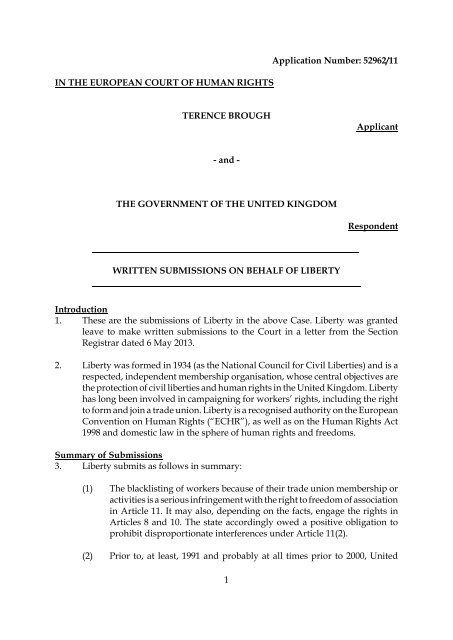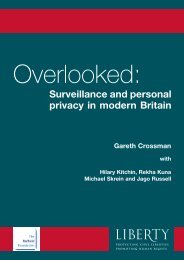Brough v UK â European Court of Human Rights 2013 - Liberty
Brough v UK â European Court of Human Rights 2013 - Liberty
Brough v UK â European Court of Human Rights 2013 - Liberty
You also want an ePaper? Increase the reach of your titles
YUMPU automatically turns print PDFs into web optimized ePapers that Google loves.
27“damage” by reason <strong>of</strong> a contravention <strong>of</strong> the data protection principles. Thereremain serious difficulties in using the DPA 1998 to counteract blacklisting - forexample, the information may not be in a “relevant filing system” or processedelectronically, or it may be impossible to show that an individual lost a particularpost because <strong>of</strong> unlawful processing (the DPA 1998 provides no compensation28for injury to feelings or distress unless there is also pro<strong>of</strong> <strong>of</strong> financial loss ).However, the relevant provisions <strong>of</strong> the DPA 1998, including the right toindividual compensation for a breach <strong>of</strong> the Act in s.13, only became effective29as legal duties from 1 March 2000 and have no retrospective effect. A copy <strong>of</strong>the DPA 1998 is at Appendix 5.16. The IC is required to promote the observance <strong>of</strong> the DPA 1998 by data30controllers. For example, the IC has the power to conduct assessments onrequest <strong>of</strong> whether processing is being carried out in compliance with the Act,31and to require information to be provided for that purpose. He may also issueenforcement notices where he is satisfied there has been a contravention <strong>of</strong> thedata protection principles, requiring a person e.g. to refrain from processing32data, a breach <strong>of</strong> which is a criminal <strong>of</strong>fence. It is not a criminal <strong>of</strong>fence to fail33to comply with the data protection principles, and a criminal prosecution mayonly be brought by the IC or with the consent <strong>of</strong> the Director <strong>of</strong> Public34Prosecutions. The action taken to date by the IC is set out above, and the IC hasmade clear he will not be taking further action - in part because he considersmany <strong>of</strong> the construction companies may not have held “data” within themeaning <strong>of</strong> the DPA. 3517. EPCA 1978. In 1988 the protection given against blacklisting by the legislationon trade union victimisation, preceding TULRCA 1992, was very restricted. Byvirtue <strong>of</strong> s.23 <strong>of</strong> the Employment Protection (Consolidation) Act 1978 (“EPCA1978") an “employee” had the right not to have action short <strong>of</strong> dismissal taken272829See s.13.See s.13(2)(a) DPA 1998.Moreover, by virtue <strong>of</strong> the transitional provisions in Schedule 8 DPA 1998, in broad terms,data processed before 24 October 1998 were not subject to data protection principles until October2001 or 2007.30313233See s.51.See ss.42-43.See s.40 and s.47.Which is why Mr Kerr was prosecuted for the failure to register as a data controller, unders.21 DPA 1998.3435See s.60(1).This is on the basis that they did not record data electronically or in a relevant filing system:see the Enforcement Recommendation Report <strong>of</strong> 13 May 2006 at Appendix 2.6
against him “by his employer” for the purpose <strong>of</strong> e.g. deterring him from beinga member <strong>of</strong> a trade union or taking part in the activities <strong>of</strong> an independent tradeunion. Similarly, by virtue <strong>of</strong> s.58 EPCA, it was unfair for an employer to dismissan employee for such reasons. But, as explained in the Application, these sectionswere restricted to the treatment <strong>of</strong> an existing employee by his or her existingemployer. They could not apply to discrimination against potential employees.The relevant provisions <strong>of</strong> EPCA 1978 are in Appendix 6.18. On 1 January 1991, s.1 <strong>of</strong> the Employment Act 1990 introduced a right <strong>of</strong>complaint to an employment tribunal where a person was refused employmentbecause <strong>of</strong> his or her trade union “membership”, a provision later consolidatedin s.137(1) <strong>of</strong> TULRCA. In practice, however, this section too provides littleeffective protection against blacklisting <strong>of</strong> the sort carried out by the EconomicLeague, TCA or the construction companies who were members <strong>of</strong> theseorganisation because (i) it is restricted to trade union “membership” notactivities, allowing a tribunal to finds a person was refused employment because36<strong>of</strong> his trade union activities and not his union membership; and (ii) it has noapplication to the other kinds <strong>of</strong> blacklisting revealed by the examples in AnnexA to the SAC Report, such as blacklisting owing to political activities oraffiliation.19. Other potential rights <strong>of</strong> action in domestic law. There is a common law tort <strong>of</strong>conspiracy, comprising two forms (i) conspiracy to injure, which requires apredominant purpose to injure the claimant; and (ii) conspiracy to use unlawful37means. There are three difficulties with such claims in relation to blacklisting.First, any claimant must show that a particular employment opportunity waslost as a result <strong>of</strong> using the database <strong>of</strong> the Economic League or the TCA and sothat he suffered financial loss for the purpose <strong>of</strong> a tort claim because there are no38damages for injury to feelings or non-financial loss. Second, the tort <strong>of</strong>conspiracy to injure requires pro<strong>of</strong> that the conspirators acted with the39predominant purpose <strong>of</strong> injuring the claimant. So long as the purpose <strong>of</strong> the36In Harrison v Kent County Council [1995] ICR 434, referred to in para21 <strong>of</strong> the Application,the Employment Appeal Tribunal held that it was “open” to a tribunal to find that refusal foremployment due to past trade union activities was in fact because <strong>of</strong> membership: see p 443. But itdid not find that it a tribunal was obliged to do so. Morever, the decision <strong>of</strong> the EAT was based on thewide conception <strong>of</strong> trade union “membership” adopted by the <strong>Court</strong> <strong>of</strong> Appeal in Associated BritishPorts v Palmer [1994] ICR 97: see 443. The <strong>Court</strong> <strong>of</strong> Appeal’s decision was subsequently overturnedby the House <strong>of</strong> Lords, who took a narrower view <strong>of</strong> what counted as “membership”: see AssociatedBritish Ports v Palmer [1995] 2 AC 454 (which is at Appendix 13 to the Application), especially perLord Bridge at 478A-G, Lord Lloyd at 484G-485C.3738thSee Clerk & Lindsell on Torts, 20 edition, at para. 24-91 (Appendix 7).Note that damage for the purpose <strong>of</strong> conspiracy do not include injury to feelings or othernon-financial loss: see Clerk & Lindsell, above, at para. 24-111.39See Clerk & Lindsell, above, at paras 24-107-1087
dismissal <strong>of</strong> trade union <strong>of</strong>ficers for an abusive newsletter infringed Article 10.As the <strong>Court</strong> pointed out by reference to Ezelin v France (26 April 1991) andother cases, the protection <strong>of</strong> personal opinions is also one <strong>of</strong> the objectives <strong>of</strong>47freedom <strong>of</strong> assembly and association in Article 11. The <strong>Court</strong> stated at para. 56:The <strong>Court</strong> takes the view that the members <strong>of</strong> a trade union must be ableto express to their employer their demands by which they seek toimprove the situation <strong>of</strong> workers in their company....Consequently, forthe purpose <strong>of</strong> guaranteeing the meaningful and effective nature <strong>of</strong> tradeunion rights, the national authorities must ensure that disproportionatepenalties do not dissuade trade union representatives from seeking toexpress and defend their members’ interests.24. In Trade Union <strong>of</strong> Police <strong>of</strong> the Slovak Republic v Slovakia (25 September 2012)the <strong>Court</strong> again cited Article 1 <strong>of</strong> ILO Convention No.98, and emphasised theduty on a national authority to ensure that disproportionate penalties do notdissuade trade union representatives from expressing and defending theirmembers’ interests. 4825. <strong>Liberty</strong> also points out that the blacklisting <strong>of</strong> workers by the Economic League,TCA and construction companies may also, depending on the facts, haveengaged Articles 10 and 8. In Rotaru v Romania (4 May 2000) the <strong>Court</strong> heldthat the collection and storage <strong>of</strong> information about an individuals’s private life,including his public political activities, fell within the scope <strong>of</strong> private life in49Article 8 (albeit in the context <strong>of</strong> the state holding the data). In addition,detrimental treatment <strong>of</strong> workers because <strong>of</strong> their political or personal opinionsmay equally engage Article 10, just as the <strong>Court</strong> held in Sanchez. Although theApplication is made solely on the basis <strong>of</strong> Article 11, no doubt that Article shouldbe interpreted in the light <strong>of</strong> Articles 8 and 10: see Trade Union <strong>of</strong> Police in theSlovak Republic at para. 52.26. Refusing employment because <strong>of</strong> past trade union activities or membership is aparticularly serious infringement with the right to freedom <strong>of</strong> association,striking at the very essence <strong>of</strong> the rights in Article 11. It is no doubt a breach <strong>of</strong>ILO Convention No.98, to which the <strong>Court</strong> has <strong>of</strong>ten referred in interpretingArticle 11, and the <strong>European</strong> Social Charter. It is a more serious infringementthan the threat by the Minister <strong>of</strong> the Interior in Trade Union <strong>of</strong> Police in theSlovak Republic that he might sanction trade union representatives which the4748See para.52.See paras 34 and 55. The state owes a positive obligation to secure enjoyment <strong>of</strong> the rightsin Article 11, derived from Article 1, and to protect trade union members against their employer: seee.g. Gustaffson v Sweden 22 EHRR 409 at para.45; Wilson v United Kingdom, above, at para.41.49See paras 43-44. See similarly Copeland v United Kingdom (3 April 2007).9















